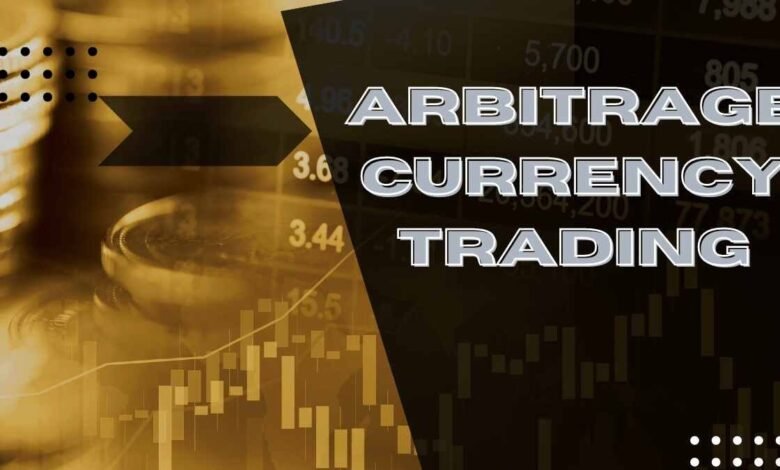
One of the strategies that takes advantage of such inefficiencies is arbitrage currency trading foreign exchange, or Forex. In general, currency trading and the Forex are activities conducted 24 hours a day in which millions of transactions are undertaken worldwide. Despite its size and liquidity, such a market will never be immune to inefficiency, hence, creating room for arbitrage. This guide will take you through the concept of, focusing on how traders can profit from exchange rate discrepancies across different pairs and platforms. Whether you are a beginner looking to understand arbitrage or a seasoned trader wanting to fine-tune your strategy, this article covers everything you need to know.
What is Arbitrage Currency Trading?
It is the simultaneous buying and selling of a currency pair across different markets to take advantage of price differences. The bottom line is you are selling a currency in one market where it is highly overvalued and buying it in another where it is highly undervalued, thus earning the difference. Though these differences are tiny, they do present risk-free profit opportunities, provided you can execute trades quickly enough. This is very important because Forex prices change very rapidly.
Types of Arbitrage in Currency Trading
The various ways arbitrage occurs globally with regards to Forex trading include the following most popular types of arbitrage:
Simple Arbitrage
In straightforward arbitrage, you are buying the same currency pair at two different markets using the arbitrage opportunity in form of price differences of the markets. By so doing, considering an example, you could take EUR/USD as 1.1000 at Market A and 1.1005 at Market B, thereby being able to buy Euros at Market A and sell out at Market B for your own difference in price.
Triangular Arbitrage: Arbitrage Currency Trading
Triangular arbitrage is the much more complicated type, using three types of currencies. It happens when there’s a misunderstanding in the three exchange rates.
Statistical Arbitrage
This is a technical form of arbitrage based on statistical models for discovering inefficiencies in the pricing of market securities. It involves historic data, algorithms, and software to identify short-term imbalances between currencies within pairs. Such arbitrage usually gets executed by large financial houses or more sophisticated traders who possess robust computing capabilities.
How Does Arbitrage In The Forex Market Work?
It is all about timing. This is the step-by-step procedure on how it is done:
Identify price fluctuations
This also suggests that traders monitor various markets of Forex. In the present technology, most trading is done through specific algorithms that recognize mismatches within a matter of milliseconds.
Executing Simultaneous Trades
The essence of arbitrage is trading at the same time. You can’t have any time gap between buying and selling, or the market will move, eliminating any potential profit.
Risk-Free Profits:
This execution speed is very important since most of these price differences are just for seconds, and in arbitrage, if the technique is properly executed, there will be no risk for such a profit.
Must Visit: Twist Tale
What Causes Exchange Rate Discrepancies?
The Forex market depicts various factors that explain the presence of anomalies in the exchange rate because of:
Market Liquidity
The forex is one very liquid market; however, its liquidity varies among the trading sessions and also with various platforms. Different markets present different rates of the same currency pair because of some varied differences.
Differences in Trading Platforms
The quoted prices of different currency pairs might differ marginally at Forex platforms or brokers. These differences might be due to the time gap in updating the price or from using different spreads and, hence offer ample opportunities for arbitrage trading.
Time Zone Differences
Forex operates 24/5 but with different markets opening at different times. One currency pair can be trading at one price in the Asian session and at a different price in the European session, hence creating an opportunity for arbitrage.
Tools and Techniques in Arbitrage Currency Trading
For traders to be successful in arbitrage trading, they have been making use of many tools and techniques.
Forex Arbitrage Software
Many traders use certain software that detects arbitrage. These software will scan real-time prices in several markets and compare currency prices to alert traders of such discrepancies.
High-Frequency Trading (HFT)
High-frequency trading systems allow a trader to conduct multiple trades within a millisecond; hence, they are perfect for arbitrage strategies. HFT algorithms are designed to exploit even the smallest price differences before they disappear.
Low Latency Connections
Low Latency Connections Speed is everything in arbitrage trading. Fast and reliable internet with low latency is very important. Most arbitrage traders use virtual private servers to ensure their trade is executed as fast as possible.
Risks and Challenges in Arbitrage Trading
Although arbitrage is a relatively low-risk strategy, it does not come without its challenges.
Execution Delays
One of the biggest risks in arbitrage trading is the delay in execution. The Forex market moves too fast for any delay between a mismatch discovery and the execution of the trade to eliminate potential profits.
Transaction Costs
Most times, the margin would not be wide enough to bear these costs; hence, profits would be absent.
Regulatory Changes
Regulatory changes also alter the arbitrage opportunities. This might be in the form where other countries have restricted some currencies in certain transactions. Some find it problematic or sometimes unlawful to trade in those specific areas.
How to Start Arbitrage Currency Trading
Choose a Reputable Broker
First, the Forex broker must have low spreads coupled with high execution times. You may also want to choose a Forex broker that supports multiple trading platforms since the arbitration process requires opening access to different markets so that they can operate perfectly.
Set Up Arbitrage Software
Invest in arbitrage software that will help you notice and identify some of the price differences on those platforms. Such software saves time but enables the discovery of opportunities that, otherwise, would never have been noticed.
Practice Using A Demo Account
It is wise to create demo accounts for yourself and trade live on those accounts before entering actual trading. This way, you will test your strategy under real market conditions without risking real money.
Start Small
It is always better to start live trading with low investment because arbitrage profits can be very small but they tend to accumulate. You get ample time to perfect your strategy without too much risk exposure when you begin with a smaller amount.
Conclusion
Arbitrage currency trading is a peculiar, safe method of profiting from the Forex market, if you are in a position to catch that price anomaly in sufficient time.
It is from this knowledge of different types of arbitrage, the application of proper tools, and even the most efficient trading that hidden opportunities from the market are unlocked. Challenges do exist in the arbitrage trade, and some of the biggest risks of speed and transaction costs. No other strategy beats it for consistency and low-risk gains, however.
Whether you are a novice in Forex trading or an experienced trader, arbitrage trading may be the best way to diversify portfolios and increase profitability.
FAQs
What is the advantage of arbitrage trading in Forex?
Arbitrage trading is a risk-free profit by exploiting price discrepancies between markets. If executed quickly, it ensures gains without exposing one to market risk.
Is arbitrage currency trading suitable for beginners?
Arbitrage is generally of very low risk but suits more experienced traders who will demand technical tools and fast execution time. Yes, you can have high profits with arbitrage. The arbitrage profits are usually small in size, but consistent execution helps to reap large profits over time.
The biggest challenges of arbitrage trading are?
The main challenges are delay in execution, transaction costs, and finding reliable tools for the detection of arbitrage opportunities. Yes, for arbitrage trading, one requires custom-made software. In fact, most arbitrage traders use software or algorithms to scan markets and look for real-time discrepancies.
Read More: Framework for Marketing Management





